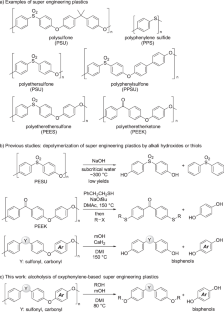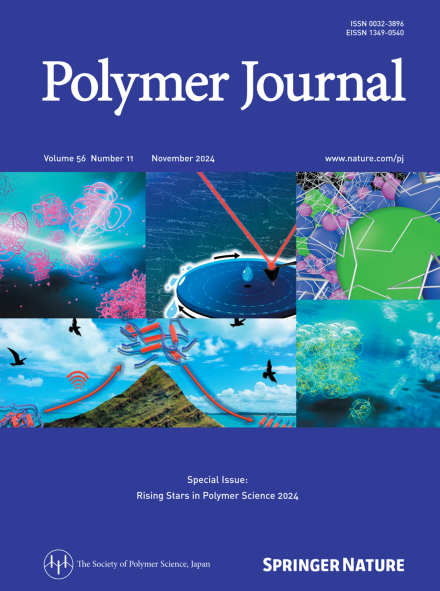在易得碱介导下氧苯基超级工程塑料的烷氧基化作用
IF 2.7
4区 化学
Q3 POLYMER SCIENCE
引用次数: 0
摘要
在此,我们介绍了超级工程塑料在温和条件下的醇解过程。在 1,3-二甲基-2-咪唑烷酮(DMI)中以氢氧化钠为介质,在 80 °C 下用甲醇处理聚砜(PSU),可轻松解聚形成高产率的双(4-甲氧基苯基)砜和 4,4'-(丙烷-2,2-二基)二苯酚(双酚 A)。这些产物很容易通过简单的过滤分离出来。DMI 溶剂可有效促进解聚,并使聚醚醚酮(PEEK)等不溶性树脂发生反应。这种方法也适用于其他醇类,如乙醇和异丙醇。本文章由计算机程序翻译,如有差异,请以英文原文为准。


Alcoholysis of oxyphenylene-based super engineering plastics mediated by readily available bases
Herein we describe the alcoholysis of super engineering plastics under mild conditions. Treatment of polysulfone (PSU) with methanol mediated by sodium hydroxide in 1,3-dimethyl-2-imidazolidinone (DMI) at 80 °C resulted in facile depolymerization to form bis(4-methoxyphenyl)sulfone and 4,4’-(propane-2,2-diyl)diphenol (bisphenol A) in high yields. These products were readily isolated by simple filtration. The DMI solvent effectively promoted depolymerization and allowed insoluble resins such as polyetheretherketone (PEEK) to undergo the reaction. This method was applicable to other alcohols, such as ethanol and isopropyl alcohol. The depolymerization of super engineering plastics such as polysulfone (PSU) smoothly proceeded in the presence of methanol mediated by sodium hydroxide in 1,3-dimethyl-2-imidazolidinone (DMI) at 80 °C to form bis(4-methoxyphenyl)sulfone and 4,4’-(propane-2,2-diyl)diphenol (bisphenol A) in high yields. These products were readily isolated by simple filtration. The DMI solvent effectively promoted depolymerization and allowed insoluble resins such as polyetheretherketone (PEEK) to undergo the reaction. This method was applicable to other alcohols, such as ethanol and isopropyl alcohol.
求助全文
通过发布文献求助,成功后即可免费获取论文全文。
去求助
来源期刊

Polymer Journal
化学-高分子科学
CiteScore
5.60
自引率
7.10%
发文量
131
审稿时长
2.5 months
期刊介绍:
Polymer Journal promotes research from all aspects of polymer science from anywhere in the world and aims to provide an integrated platform for scientific communication that assists the advancement of polymer science and related fields. The journal publishes Original Articles, Notes, Short Communications and Reviews.
Subject areas and topics of particular interest within the journal''s scope include, but are not limited to, those listed below:
Polymer synthesis and reactions
Polymer structures
Physical properties of polymers
Polymer surface and interfaces
Functional polymers
Supramolecular polymers
Self-assembled materials
Biopolymers and bio-related polymer materials
Polymer engineering.
 求助内容:
求助内容: 应助结果提醒方式:
应助结果提醒方式:


